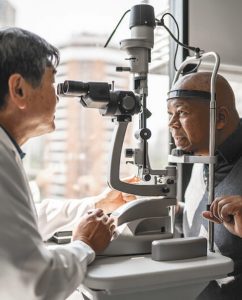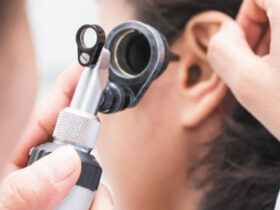 January is Glaucoma Awareness Month, the perfect time to raise awareness for this sight-stealing disease. Nearly all of us begin to experience some vision changes as we age, even if it’s just having to rely on a cheap pair of readers from the grocery store. In order to remain independent as we get older, we need to know about age-related changes that could potentially affect our day-to-day lives. And vision loss – primarily glaucoma – is one of those changes.
January is Glaucoma Awareness Month, the perfect time to raise awareness for this sight-stealing disease. Nearly all of us begin to experience some vision changes as we age, even if it’s just having to rely on a cheap pair of readers from the grocery store. In order to remain independent as we get older, we need to know about age-related changes that could potentially affect our day-to-day lives. And vision loss – primarily glaucoma – is one of those changes.
What is Glaucoma?
According to the CDC, more than 3 million Americans have glaucoma, but only half actually know it. It is the second leading cause of blindness worldwide. Glaucoma is a group of diseases that damage the eye’s optic nerve due to increased pressure inside the eye. The progression of the disease is usually gradual. However, once glaucoma has caused damage resulting in vision loss, the damage is permanent and irreparable.
Early Glaucoma Symptoms
Because vision loss caused by glaucoma cannot be restored, it’s important that seniors watch out for signs and symptoms that could be an indication they have the eye disease. If caught early, glaucoma’s progression can be slowed by various treatment methods, including surgery.
Some of the early signs of glaucoma include:
. Loss of side vision
. Inability to adjust to darkened rooms
. Blurred or foggy vision, especially when awakening
. Eye pain
. Severe headaches
Who’s at Risk for Developing Glaucoma?
While anyone can get glaucoma, the risk is higher in people over the age of 60. Others with an increased risk of getting glaucoma include African Americans over the age of 40 and people who have diabetes. Glaucoma is also hereditary, so it’s important to know your family history. According to the Glaucoma Research Foundation, your risk of developing primary open-angle glaucoma is up to nine times higher than average if one of your parents or siblings has the disease.
Other possible risk factors include:
. High myopia (nearsightedness)
. Hypertension
. Central corneal thickness less than .5 mm
Take Action to Prevent Glaucoma
Vision loss and glaucoma aren’t a given just because you get older. There are steps you can take to protect your eyes and lower your risk of getting glaucoma. When it comes to this progressive eye disease, early detection and prevention are key.
Whether you fall into a high-risk category or not, make sure you’re getting routine comprehensive dilated eye exams. These exams help to catch glaucoma and other eye diseases early when they are most treatable. Your eye care specialist will instruct you on how frequently you need to receive these exams. However, Medicare covers a glaucoma test once a year for people in high-risk groups, so be sure you take advantage of this benefit.
In addition to getting your eyes checked, you should try to do the following steps to help prevent glaucoma:
Exercise – Regular physical activity can help to lower intraocular pressure (IOP).
Maintain a stable weight – A high Body Mass Index (BMI) causes pressure in the eyes, while a low BMI can cause the optic nerve to press inward.
Stop smoking – Smoking causes thinning of the retinal nerve fiber layer, a symptom of glaucoma.
Monitor your blood pressure – Increased blood pressure results in increased eye pressure.
Glaucoma Treatment Options
Early onset of glaucoma usually affects your peripheral vision first – what you can see on the side of your head when looking ahead. If not treated in time and effectively, your central vision – vision used to see objects clearly – will also begin to be affected.
Early treatment intervention is vital to preserving your eyesight. Glaucoma is treated with eye drops, oral medication, and surgery. Treatment methods may be combined depending on your specific needs. The goal of treatment is to reduce the pressure in your eye.
You should always follow any specific directions given by your healthcare professional, whether it be your primary care provider or your eyecare specialist. Glaucoma is a highly detectable disease and one that can be managed properly. Make your eye health a priority. Schedule an appointment with a VIPcare provider to discuss your risk and what preventative measures you can take to protect your eyesight. Call 239-747-7202.
239-747-7202
www.getvipcare.com
9976 South Tamiami Trail, Ste 206
Estero, FL 33928







